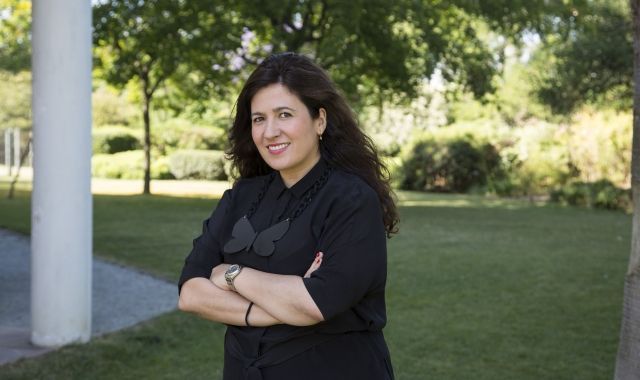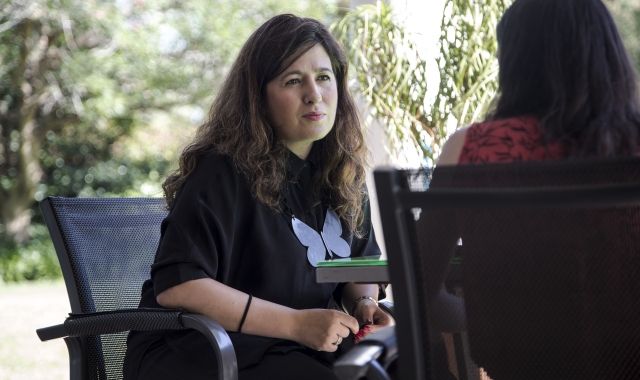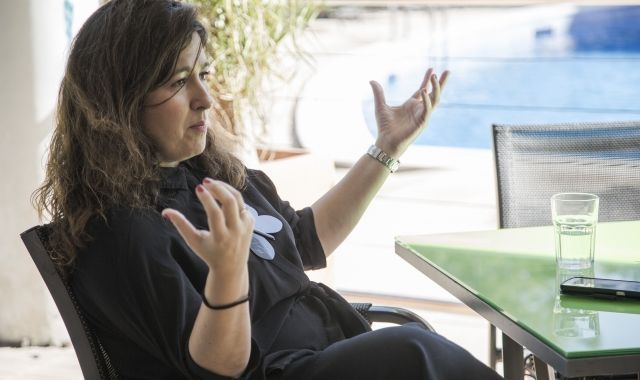
It is in large part her fault that more than a few of us shed a tear last Christmas over Ikea’s "L'altra carta" (The Other Letter), in which a group of children made a wishlist for their parents alongside the one they would send to the Three Kings. Yet, we also have to thank her for the laughs we got out of the ingenious verses in the latest campaign by the Swiss chain, "Diga-li cantant" (Say it in Song). Coca-Cola, state lotteries and Campofrío are some of the other brands that have entrusted their ad campaigns to Mónica Moro.
Moro is the creative director of the McCann agency, the only one in Spain among the world’s top 20 ad agencies. She joined as an intern while studying at Madrid’s Complutense university and went on to make a career in the agency. Today, she has become a leading figure in the sector, both for her talent and for being one of the few women in the world of publicity. This latter fact is something she regrets and fights against, in a society that she says is in the prehistoric age where gender equality is concerned. In an interview with VIA Empresa, during the Cornellà Creació Forum, she says that she loves communicating ideas and emotions, getting projects going from scratch and, especially, people who are curious.
How did you become one of the best creatives in Spain?
The main thing is choosing a profession you like and that was what I did. I love it, it inspires me, and at the beginning I even thought I would be willing to do it for free. In fact, I had to for quite a while when I first began. Once you are in, a lot of factors come into play, such as having good teams next you -I could never have come this far alone- and, obviously, a dash of luck.
What do you think about the phrase: “Women are less creative than men”?
I reject that out-of-hand. It seems like a lack of respect to me that there are still people who dare say such things when the world is full of women doing amazing things. However, for many years it was believed that only men had the artistic touch. It used to be said that the only way a woman’s name could get into a museum was if she appeared naked in one of the paintings. It is a mistake because leaving out women means leaving out half of the population. What’s more, in publicity it makes no sense in financial terms. Women are the ones who make the decisions when it comes to household purchases, and so not taking them into account is the equivalent of ignoring what a large part of your public thinks.
"Leaving out women means leaving out half of the population"
Despite also having this talent and being in the majority in faculties that teach advertising, few women reach top positions in this profession...
There is still a lot to do. To draw an analogy with football, there are still a lot of games yet to play. For starters, women need to be given more visibility with positions of responsibility so that they can lead the way for those who come after them. We also need to start taking credit for our successes instead of putting it down to luck. It is very common that when a woman is asked "how did you come this far?" she answers "I have had a lot of luck." You would never hear a man say that! He would tell you that he had worked very hard. We have to be more ambitious, to clearly say what we want and to negotiate pay rises and promotions. To achieve these landmarks, networking is very important, so as to have contact among ourselves. It is true that things have come a long way in recent years, especially in empowerment, but we are still a long way from real equality. You just have to look at the pay gap.

Photo: Àngel Bravo
Does today’s advertising have anything to do with Mad Men?
The aim, understanding and reaching people, is the same, but the way of working has changed completely. The profession has become more sophisticated, and there is no longer anyone drinking vodka or smoking in the office.
Is this change in the office reflected in a change in the profile of the people who work there? How have universities adapted to this change?
Technology has swept into all aspects of life and advertising is no exception. You no longer transmit messages to consumers, but rather I like to say that you talk to the public. Brands are no longer their own masters, but also the property of whoever buys them and makes them their own. This whole change, in which the social networks play a fundamental role, means that campaigns are much more complex and require much more varied profiles. As it is almost impossible for a single agency to have all the knowledge it needs among its staff, the sector is becoming increasingly collaborative.
"We women have to be more ambitious, say clearly what we want and negotiate pay rises and promotions"
For example?
If I need some engineers to develop an app with particular specifications for a client, we call whoever does what we are looking for. As for universities, it would be good if they were to add some touches to new profiles related to technology, but it is impossible for them to move ahead at the same pace as the rest of humanity. That is why, for me, the most important thing is for people to be curious. The most important thing is not what or where you were taught, but rather that you are keen to learn and that you make an effort to obtain this knowledge.

Photo: Àngel Bravo
Is advertising a tool for transforming society?
Absolutely. I like those companies that display what they think and believe in. There was a study a while ago that said that the public would not care if 80% of brands were to disappear. If you want to be in the 20%, what matters is that you are relevant. For example, just selling a shampoo is not the same thing as selling a shampoo while you also explain and defend the concept of beauty and its impact on society.
Which campaigns do you remember most fondly?
You love all of your children equally!